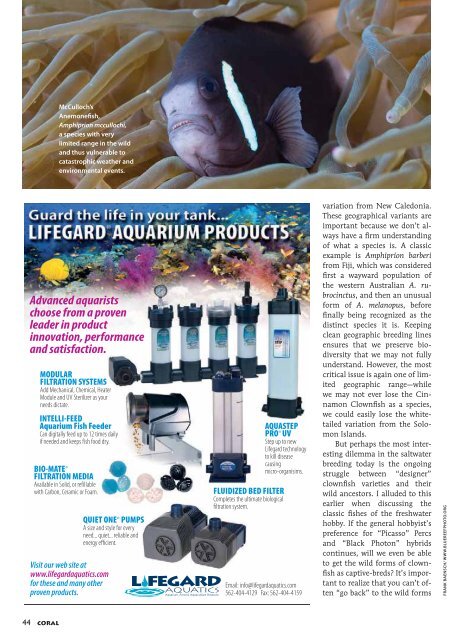You also want an ePaper? Increase the reach of your titles
YUMPU automatically turns print PDFs into web optimized ePapers that Google loves.
McCulloch’s<br />
Anemonefish,<br />
Amphiprion mccullochi,<br />
a species with very<br />
limited range in the wild<br />
and thus vulnerable to<br />
catastrophic weather and<br />
environmental events.<br />
Advanced aquarists<br />
choose from a proven<br />
leader in product<br />
innovation, performance<br />
and satisfaction.<br />
MODULAR<br />
FILTRATION SYSTEMS<br />
Add Mechanical, Chemical, Heater<br />
Module and UV Sterilizer as your<br />
needs dictate.<br />
INTELLI-FEED<br />
Aquarium Fish Feeder<br />
Can digitally feed up to 12 times daily<br />
if needed and keeps fish food dry.<br />
BIO-MATE®<br />
FILTRATION MEDIA<br />
Available in Solid, or refillable<br />
with Carbon, Ceramic or Foam.<br />
Visit our web site at<br />
www.lifegardaquatics.com<br />
for these and many other<br />
proven products.<br />
QUIET ONE® PUMPS<br />
A size and style for every<br />
need... quiet... reliable and<br />
energy efficient.<br />
FLUIDIZED BED FILTER<br />
Completes the ultimate biological<br />
filtration system.<br />
AQUASTEP<br />
PRO® UV<br />
Step up to new<br />
Lifegard technology<br />
to kill disease<br />
causing<br />
micro-organisims.<br />
Email: info@lifegardaquatics.com<br />
562-404-4129 Fax: 562-404-4159<br />
variation from New Caledonia.<br />
These geographical variants are<br />
important because we don’t always<br />
have a firm understanding<br />
of what a species is. A classic<br />
example is Amphiprion barberi<br />
from Fiji, which was considered<br />
first a wayward population of<br />
the western Australian A. rubrocinctus,<br />
and then an unusual<br />
form of A. melanopus, before<br />
finally being recognized as the<br />
distinct species it is. Keeping<br />
clean geographic breeding lines<br />
ensures that we preserve biodiversity<br />
that we may not fully<br />
understand. However, the most<br />
critical issue is again one of limited<br />
geographic range—while<br />
we may not ever lose the Cinnamon<br />
Clownfish as a species,<br />
we could easily lose the whitetailed<br />
variation from the Solomon<br />
Islands.<br />
But perhaps the most interesting<br />
dilemma in the saltwater<br />
breeding today is the ongoing<br />
struggle between “designer”<br />
clownfish varieties and their<br />
wild ancestors. I alluded to this<br />
earlier when discussing the<br />
classic fishes of the freshwater<br />
hobby. If the general hobbyist’s<br />
preference for “Picasso” Percs<br />
and “Black Photon” hybrids<br />
continues, will we even be able<br />
to get the wild forms of clownfish<br />
as captive-breds? It’s important<br />
to realize that you can’t often<br />
“go back” to the wild forms<br />
FRANK BAENSCH/ WWW.BLUEREEFPHOTO.ORG<br />
44 CORAL

















